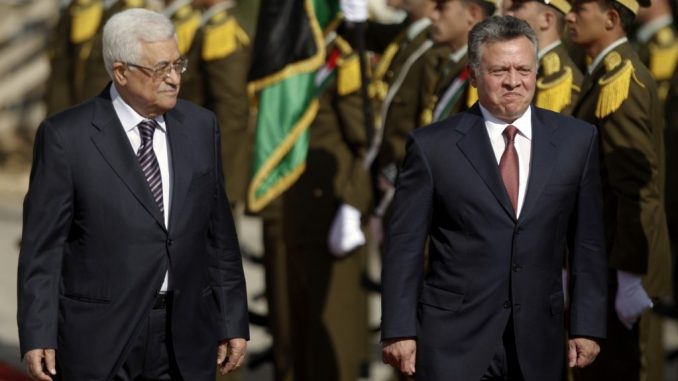
Jordanian King Abdullah’s forthcoming visit to Ramallah Monday, Aug. 7, for talks with Palestinian Authority Chairman Mahmoud Abbas, bodes ill for Jordanian-Israeli relations at an especially jarring moment.
The Israeli embassy security officer Ziv Moyal, who on July 24 shot dead two Jordanians in the embassy compound when he was attacked with a screwdriver, left a trail of Jordanian ill will in his wake, especially since the incident occurred in the middle of the Temple House crisis in Jerusalem.
King Abdullah proposes to turn this unfortunate incident into a springboard for persuading the Palestinian leader to work with Jordan in the framework of the peace initiative US President Donald Trump is trying to resuscitate between Israel and the Palestinians.
Abdullah also plans to tale advantage of Israeli Prime Minister Binyamin Netanyahu at a moment of political and personal weakness. He is under a barrage of reported police investigations into allegations of corruption. Netanyahu has brushed the reports aside as “background noise.”
Jordan and Israeli signed a peace treaty in 2004. But since the shooting at the embassy, the Israeli ambassador and staff have not returned to Amman. And with tensions still running high, there is no sign that normal diplomatic business will be resumed any time soon.
In Ramallah, security cooperation between the Palestinian Authority and Israel is still suspended, since Abbas ordered a freeze in the heat of the Palestinian disturbances over the security measures Israel put in place after the murder of two of is police guards.
The Jordanian king believes that there is plenty of common fodder for him and the Palestinian leader to build a united front that will boost him politically and personally at home. The Hashemite throne is in urgent need of shoring up after the shaking it took from an event that had nothing to do with Temple Mount, Jerusalem or Israel.
Abdullah had to sign a life sentence handed down by a Jordanian court against Marik al-Tuwayha, a Jordanian soldier who fired 70 bullets into vehicle of carrying US military instructors, killing three of them.
The court also booted the shooter out of the royal armed forces.
This judgment was a direct hit at the Tuwayha, a Bedouin tribe that by tradition sends its sons to the royal army and is historically loyal to the Hashemite throne. The fact that one of those sons attacked American soldiers carried the dread message that extremist ISIS ideology has penetrated deep into the king’s most solid power base.
The monarch is therefore in an extremely tight spot: He can’t afford to lose the Tuwayha tribe’s allegiance, on the one hand, but neither can be afford to alienate the Americans, when the US along with Israel, are his regime’s economic and security mainstay.
Netanyahu’s warm hug for the security officer on his safe return from Amman put up too many backs in Jordan and its streets for its king to weather the storm without striking a strong anti-Israeli posture. The Palestinian leader will no doubt take advantage of this situation to stir up the crisis between Amman and Jerusalem and so and lift his own plummeting fortunes in the Palestinian street. The royal visit to Ramallah, the first Abdullah has made in five years, will most likely produce a stream of invective against Israel and tough statements assailing Israel’s right to sovereignty over Jerusalem and Temple Mount.



No, the date is wrong. I googled it.
“People also ask
When did Israel and Jordan sign a peace treaty?
26 October 1994
On 26 October 1994, Jordan and Israel signed the peace treaty in a ceremony held in the Arava valley of Israel, north of Eilat and near the Jordanian border. Prime Minister Rabin and Prime Minister Abdelsalam al-Majali signed the treaty and the President of Israel Ezer Weizman shook hands with King Hussein.”
Israel–Jordan peace treaty – Wikipedia
https://en.wikipedia.org/wiki/Israel–Jordan_peace_treaty
—
Also, it should be noted that there was de facto peace from the 1967 on.
Nothing more conducive to peace than fear of getting your ass kicked.
https://www.thesun.co.uk/news/2281518/this-is-why-isis-are-terrified-of-israeli-soldiers-but-do-not-fear-poorly-trained-brits-or-americans-as-jihadis-are-blasted-by-idf-troops-for-the-first-time/
—
http://www.dailymail.co.uk/news/article-4456130/ISIS-fighters-APOLOGISED-attack-Israeli-soldiers.html
–
I googled this tribe. All that came up with was the name of Sgt. Marik Tuwayha, a Jordanian soldier and member of the tribe of the same name — who murdered U.S. advisers.
http://www.debka.com/article/26149/What-motivated-a-Jordanian-soldier-to-murder-3-US-instructors-
Protests as Jordanian soldier sentenced for killing
https://youtu.be/Rzh4yCoovjo
Lot of news articles about it
http://www.foxnews.com/world/2017/07/25/jordan-releases-video-showing-us-troops-surrendering-before-deadly-shooting.html
http://www.npr.org/sections/thetwo-way/2017/07/17/537748412/jordanian-soldier-sentenced-to-life-in-killing-of-3-american-troops
Even left wing NPR covered it.
How come I didn’t know or hear anything about it? Was it one of those stories that was covered once, surrounded with similar stories and then forgotten?
Also, like the Island of Peace Massacre of the Israeli schoolgirls, significant.
What would have been the reaction if the attack against the Israel guard had succeeded, not to speak of an unleashed weapon that would suddenly have become available inside the embassy? I guess Abdullah would have congratulated his minion.